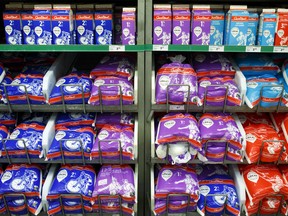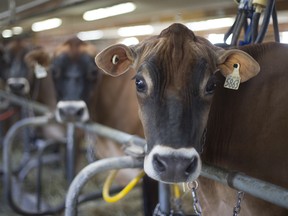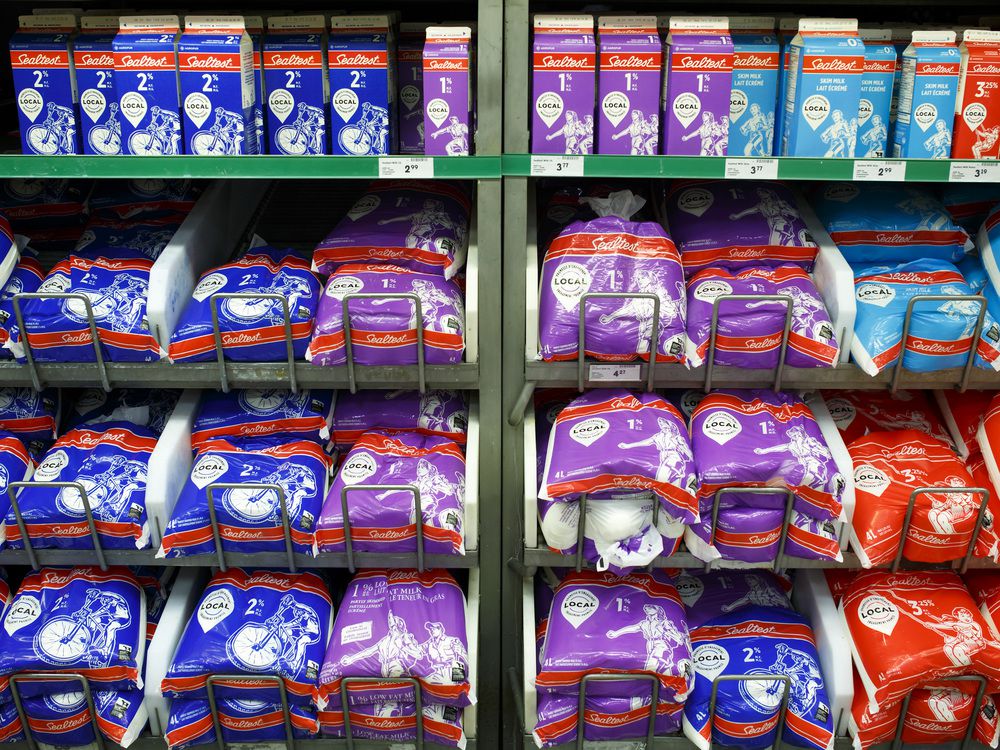Farmers say first price increase not enough to cover spikes in cost of livestock feed, fuel and fertilizer

Article content
The federal body that manages Canada’s milk supply is under pressure to raise prices for a second time this year to help dairy farmers cope with inflation.
Advertisement 2
Article content
The set price that farms receive for their milk jumped by a historic amount in February, but farmers say it’s not enough to cover unprecedented spikes in the cost of livestock feed, fuel and fertilizer.
The calls for another price hike will undoubtedly mean more debate over Canada’s supply management system, which seeks to protect dairy, poultry and egg farmers and stabilize the domestic food supply by controlling prices, capping production and blocking foreign competitors.
The Canadian Dairy Commission, a Crown corporation, is responsible for establishing what’s known as the “farm-gate” price for milk, or the amount dairy companies pay to Canadian farmers for their milk. Those increases happen once a year, and this year’s increase was controversial. CDC recommended raising the farm-gate price of milk by 8.4 per cent — an historic increase that sparked calls for more transparency in the CDC’s decision-making process. The provinces implemented that increase in February.
Advertisement 3
Article content
But less than six months later, the CDC is mulling another hike. The Dairy Farmers of Canada wants the CDC to trigger “the exceptional circumstances process” so it can implement a mid-year milk price increase, according to a June 2 memo from CDC chair Jennifer Hayes. Any price increase would be instituted on Sept. 1, and “would be deducted from any price increase that may result from the routine price review in the fall of 2022,” Hayes wrote.

The CDC will consult with industry leaders in retail, hospitality, farming and food processing between June 13 and 15. The final decision will be announced on June 17. The CDC confirmed that it has not implemented a mid-year price increase since 2018.
It wasn’t immediately clear exactly how much the Dairy Farmers of Canada are asking to raise the farm-gate price. Dairy prices at the retail level were up eight per cent in April, compared to the previous year, according to the latest Statistics Canada consumer price index. The overall inflation rate for grocery bills in April was 9.7 per cent — the worst it has been since 1981.
Advertisement 4
Article content
The Retail Council of Canada, a lobby group that represents grocery chains, blamed food inflation on food producers raising their prices.
“This points to another example of how retailers continue to face multiple price increases and/or demands from suppliers which is the primary reason why consumers’ grocery costs are increasing,” Retail Council spokesperson Michelle Wasylyshen said in an email in reaction to the calls for a dairy price hike.
-

U.S. hits back at Canada’s dairy rule changes by launching second trade dispute
-

Billionaire boss of dairy giant Lactalis says his company is facing inflation like he’s ‘never seen’
-

Soaring dairy prices drive steepest rise in food inflation in 13 years
-

Dairy firm Lactalis to raise prices on grocers by up to 15 per cent next year
Advertisement 5
Article content
But the Dairy Farmers of Canada stressed that the request only impacts farm-gate prices, and it’s still up to dairy processors and retailers to set their own prices further down the supply chain.
DFC said the farm-gate increase is necessary because farmers are facing “never-before-seen” spikes in costs for the commodities needed to produce milk, which have continued to go up in the months following the CDC’s last price hike. Russia’s invasion of Ukraine has caused massive jumps in the global prices for fuel and fertilizer, as well as grains, which are currently in short supply in Canada due to last summer’s extreme drought across the Prairies.
“Dairy farmers are not the cause of food inflation but have to adapt to the current reality just like everyone else,” DFC said in a statement. “Self-sufficiency in our food production is essential; supply management is a pillar of food sovereignty that has and will continue to protect Canadians now and into the future.”
• Email: jedmiston@postmedia.com | Twitter: jakeedmiston


